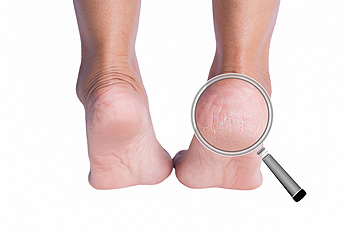
Cracked heels, also known as heel fissures, are common and can affect anyone. However, women are more apt to report this condition than men. Cracked heels are unsightly, can cause discomfort, and if left untreated, can lead to infections. If the cracks run deep, it can hurt to stand and walk, and they may even bleed. Heel fissures are generally a result of dry skin but can also be caused by obesity, standing for long periods, or wearing ill-fitting shoes. Along with the cracks, the skin on the heel can become thick and discolored. Sometimes calluses can develop on the heel edge. A few home remedies one can try are moisturizing treatments, using petroleum jelly, and applying a keratolytic to thickened skin. Using creams, lotions, or ointments can help restore moisture to the skin on the heels. Petroleum jelly can be applied to cracked heels at night, and 100% cotton socks can be worn to keep moisture in, allow the skin to breathe, and prevent bed sheets from getting stained. If this condition does not abate with self-care techniques, is related to a medical condition, or an infection seems to be looming, see a podiatrist who can offer treatment options to restore you to comfort.
Cracked heels are unsightly and can cause further damage to your shoes and feet. If you have any concerns, contact Bill Brown, DPM from Brown Podiatry. Our doctor can provide the care you need to keep you pain-free and on your feet.
Cracked Heels
Cracked heels appear unappealing and can make it harder for you walk around in sandals. Aside from looking unpleasant, cracked heels can also tear stockings, socks, and wear out your shoes. There are several methods to help restore a cracked heel and prevent further damage.
How Do You Get Them?
Dry skin is the number one culprit in creating cracked heels. Many athletes, walkers, joggers, and even swimmers suffer from cracked heels. Age and skin oil production play a role to getting cracked heels as well.
Promote Healing
Over the counter medicines can help, especially for those that need instant relief or who suffer from chronic dry feet.
Wear Socks – Wearing socks with medicated creams helps lock in moisture.
Moisturizers – Applying both day and night will help alleviate dryness which causes cracking.
Pumice Stones – These exfoliate and remove dead skin, which allows for smoother moisturizer application and better absorption into the skin.
Change in Diet
Eating healthy with a well-balanced diet will give the skin a fresh and radiant look. Your body responds to the kinds of food you ingest. Omega-3 fatty acids and zinc supplements can also revitalize skin tissue.
Most importantly, seek professional help if unsure how to proceed in treating cracked heels. A podiatrist will help you with any questions or information needed.
If you have any questions, please feel free to contact our office located in Scranton, PA . We offer the newest diagnostic and treatment technologies for all your foot care needs.
